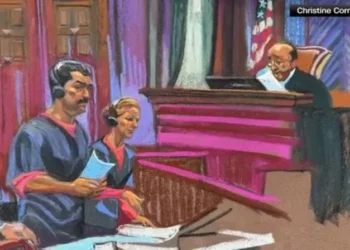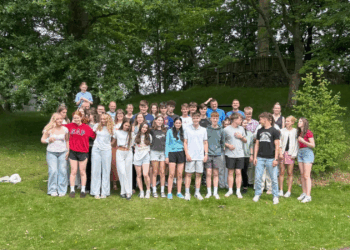It’s another milestone in the onward march of the bots — country music’s top song in the U.S. last week was Walk My Walk.
Billboard’s number one song on its “Country Digital Song Sales” chart is by a band called Breaking Rust, and, according to Billboard, Breaking Rust, itself, was created by artificial intelligence (AI).
[R]ecent technological advances in music … have gotten us ready for that moment when you genuinely can’t discern whether a piece has been generated by a human or a machine.
The future has arrived — and this is only the beginning.
“In just the past few months, at least six AI or AI-assisted artists have debuted on various Billboard rankings,” wrote Billboard just last week. “That figure could be higher, as it’s become increasingly difficult to tell who or what is powered by AI — and to what extent.”
Many of these charting projects, whose music spans every genre from gospel to rock to country, also arrive with anonymous or mysterious origins.
Look at Breaking Rust’s social media pages and you’ll find nothing to indicate there’s a human being even involved in the music-making portion of the band’s songs. What is present though is an AI-generated chisel-jawed cowboy and video clips featuring “plain folk” moseying away from the camera. To say the various songs are similar would deny reality. They are essentially the same — right down to the bland, rather vacuous lyrics.
“Breaking Rust, an AI-powered country act, debuted at No. 9 on the Emerging Artists chart (dated Nov. 1),” the music publication said. “The project, credited to songwriter Aubierre Rivaldo Taylor, has generated 1.6 million official U.S. streams.”
Being a country music fan (and from Texas), the song sounds like a lot of country songs. It’s certainly catchy and one can “visualize” people singing along while line-dancing to its rhythm.
But that’s not really the point, is it?
The significance is that there are thousands of country-western performers and composers out there, some famous, many obscure, that are losing to AI in the free market, which is causing some pain.
The Moment Matters for Music
This is the first time an AI-created country track has topped a Billboard country sales chart, a symbolic turning point for genre purists and AI policy watchers alike.
Critics argue the songs feel formulaic and create blurred authorship, while others see lower barriers for new creators using Agentic-AI tools. Both views now collide in the charts.
Streaming services are still crafting AI policies to prevent feeds from being overwhelmed and to manage disclosure. Industry groups are pushing for “guardrails” around “training data” and likeness.
Country outlets note that the Country Digital Song Sales crown can be reached with a few thousand purchases in a given week, but the symbolic impact of a No. 1 still matters.
The story here is what the story has been since AI first peeked over the horizon to announce its intent to storm popular culture, and that’s this: There’s nothing anyone can do to stop it. Nothing. AI is coming, and it’s coming for all of us. But I also believe it is neither as serious a threat as James Cameron made it out to be in Terminator, nor do I think it can replace the soul (or whatever that indefinable spark is) that makes us quintessentially human. Computers do nothing but reproduce in varying arrangements the data that has been uploaded into its memory, and there is something about the human spirit that can never be taught — inspiration, the muse, the heart — that comes from within.
Much of our popular culture today is soulless, generic, corporatized, and lacking in inspiration — perhaps that is why AI is such a real threat – it perpetuates these qualities.
Several country-western stars and corporate executives within the music industry have spoken out against AI, fearing the tech could replace songwriters and wreck the middle-class of the music industry.
“I would struggle to think something that couldn’t feel could really write a song, to make somebody else feel,” musician Riley Green told Fox News Digital of the threat of AI in music at the ACM Awards.
Mitch Glazier, chairman and CEO of the Recording Industry Association of America (RIAA), said they are prioritizing removing artificially created music that infringes on an artist’s name or likeness.
“When you’re an artist, you spend your whole life grappling with what you want to put out to the world, how you want to express your ideas, what is your art,” he said of artists’ fears. “And a lot of times it’s very personal, and it reflects your lived experience.
He continued, “It’s your genius.… It’s the essence of who you are. So, to have that taken from you is a very personal and objectionable act … that is not the art that the artist is … agreeing to make and that reflects who they are.”
As Congress debates legislation aimed at protecting creators’ image and visual likeness, last year hundreds of the world’s biggest musicians signed a letter asking tech firms to not develop AI tools to replace human creators.
Obviously, a product like “Walk My Walk” is clearly attainable. Still, could AI ever come up with “Stand by Your Man” by Tammy Wynette or “Ring of Fire” by Johnny Cash? These melodies are celebrated for their storytelling and emotional depth, interpreted and delivered in the way only these artists could — so as to capture the ethos of the American psyche.
In a Newsweek article about Breaking Rust, Jason Palamara, an assistant professor of Music Technology at Indiana University seems distinctly unimpressed. “Despite the ‘stomp, clap, hey’ rhythms and acoustic-y sound, this song is heavily laden with some very techy production techniques. It was pretty obviously the product of AI.”
Still, significant proportions of U.S. music consumers don’t seem to mind. Breaking Rust already has 2 million monthly Spotify listeners.
Arguably, one could say that recent technological advances in music — the widespread use of AutoTune on vocals, the domination of the algorithm in deciding what music we even get to listen to — have gotten us ready for that moment when you genuinely can’t discern whether a piece has been generated by a human or a machine, a point which, I suspect, we are not far from now, if it isn’t upon us already.
It seems that the time has come for artists to lean into the things that genuinely make them human: original voices, unexpected chord variations, unusual rhythm structures — in other words — the things which caused us to fall in love with music to begin with.
READ MORE from F. Andrew Wolf Jr.:
From Orwell to Brussels: The EU’s ‘Ministry of Truth’ Arrives
America’s Trade Deficits Are Not Innocuous
The Fabric of America… ‘Liberty and Justice for All’








![Florida Officer Shot Twice in the Face During Service Call; Suspect Killed [WATCH]](https://www.right2024.com/wp-content/uploads/2025/12/Inmate-Escapes-Atlanta-Hospital-After-Suicide-Attempt-Steals-SUV-Handgun-350x250.jpg)






